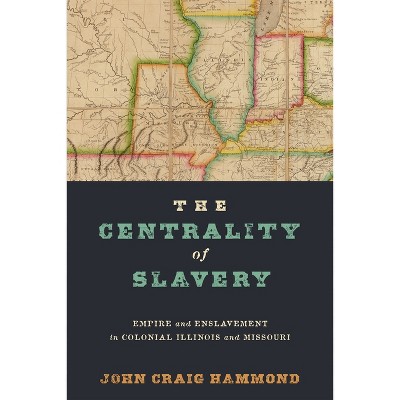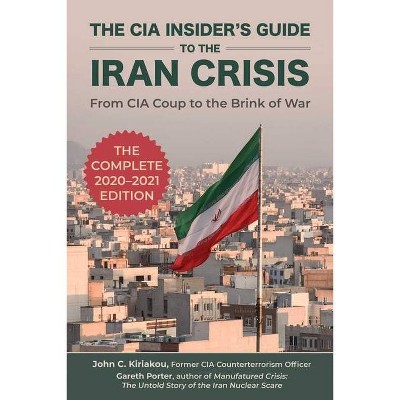Sponsored

Perils of Dominance - by Gareth Porter (Paperback)
$29.95
In Stock
Eligible for registries and wish lists
Sponsored
About this item
Highlights
- Perils of Dominance is the first completely new interpretation of how and why the United States went to war in Vietnam.
- About the Author: Gareth Porter is an independent scholar on issues of war and peace and an historian of the Vietnam conflict.
- 421 Pages
- History, Military
Description
About the Book
"This will be the most important contribution to our understanding of the war in Vietnam since the "Pentagon Papers. "I am not exaggerating or speaking for effect. Porter challenges --by and large successfully--most of the accepted views, especially on the importance of the domino theory, the belief that U. S. policy was driven by a perception of its weakness on the world scene, and the belligerence of Johnson and, to a lesser extent, Kennedy."--Robert Jervis, author of "American Foreign Policy in a New Era "Book Synopsis
Perils of Dominance is the first completely new interpretation of how and why the United States went to war in Vietnam. It provides an authoritative challenge to the prevailing explanation that U.S. officials adhered blindly to a Cold War doctrine that loss of Vietnam would cause a "domino effect" leading to communist domination of the area. Gareth Porter presents compelling evidence that U.S. policy decisions on Vietnam from 1954 to mid-1965 were shaped by an overwhelming imbalance of military power favoring the United States over the Soviet Union and China. He demonstrates how the slide into war in Vietnam is relevant to understanding why the United States went to war in Iraq, and why such wars are likely as long as U.S. military power is overwhelmingly dominant in the world.Challenging conventional wisdom about the origins of the war, Porter argues that the main impetus for military intervention in Vietnam came not from presidents Kennedy and Johnson but from high-ranking national security officials in their administrations who were heavily influenced by U.S. dominance over its Cold War foes. Porter argues that presidents Eisenhower, Kennedy, and Johnson were all strongly opposed to sending combat forces to Vietnam, but that both Kennedy and Johnson were strongly pressured by their national security advisers to undertake military intervention. Porter reveals for the first time that Kennedy attempted to open a diplomatic track for peace negotiations with North Vietnam in 1962 but was frustrated by bureaucratic resistance. Significantly revising the historical account of a major turning point, Porter describes how Secretary of Defense Robert McNamara deliberately misled Johnson in the Gulf of Tonkin crisis, effectively taking the decision to bomb North Vietnam out of the president's hands.
From the Back Cover
"This will be the most important contribution to our understanding of the war in Vietnam since the Pentagon Papers. I am not exaggerating or speaking for effect. Porter challenges --by and large successfully--most of the accepted views, especially on the importance of the domino theory, the belief that U. S. policy was driven by a perception of its weakness on the world scene, and the belligerence of Johnson and, to a lesser extent, Kennedy."--Robert Jervis, author of American Foreign Policy in a New EraReview Quotes
"This will be the most important contribution to our understanding of the war in Vietnam since the Pentagon Papers. I am not exaggerating or speaking for effect. Porter challenges--by and large successfully--most of the accepted views, especially on the importance of the domino theory, the belief that U.S. policy was driven by a perception of its weakness on the world scene, and the belligerence of Johnson and, to a lesser extent, Kennedy."
About the Author
Gareth Porter is an independent scholar on issues of war and peace and an historian of the Vietnam conflict. From 1974 through 1976, while still working on his PhD dissertation at Cornell University, he was Co-Director of the Indochina Resource Center, Washington, D.C., which carried out research on the war and lobbied for an end to U.S. military involvement in Indochina. His first book, A Peace Denied, which told the story of the negotiation and implementation of the Paris peace agreement of January 1973, was published in 1975. He edited a two-volume documentary history of the Vietnam Conflict from 1941 onward in 1979. His analysis of the political system of united Vietnam, Vietnam: The Politics of Bureaucratic Socialism, was published in 1993.Dimensions (Overall): 9.04 Inches (H) x 6.06 Inches (W) x 1.0 Inches (D)
Weight: 1.25 Pounds
Suggested Age: 22 Years and Up
Number of Pages: 421
Genre: History
Sub-Genre: Military
Publisher: University of California Press
Format: Paperback
Author: Gareth Porter
Language: English
Street Date: September 20, 2006
TCIN: 85202206
UPC: 9780520250048
Item Number (DPCI): 247-65-1095
Origin: Made in the USA or Imported
If the item details aren’t accurate or complete, we want to know about it.
Shipping details
Estimated ship dimensions: 1 inches length x 6.06 inches width x 9.04 inches height
Estimated ship weight: 1.25 pounds
We regret that this item cannot be shipped to PO Boxes.
This item cannot be shipped to the following locations: American Samoa (see also separate entry under AS), Guam (see also separate entry under GU), Northern Mariana Islands, Puerto Rico (see also separate entry under PR), United States Minor Outlying Islands, Virgin Islands, U.S., APO/FPO
Return details
This item can be returned to any Target store or Target.com.
This item must be returned within 90 days of the date it was purchased in store, shipped, delivered by a Shipt shopper, or made ready for pickup.
See the return policy for complete information.
Trending Non-Fiction

$19.31
was $20.98 New lower price
4 out of 5 stars with 64 ratings

$18.28
was $19.58 New lower price
4.7 out of 5 stars with 15 ratings

$4.59
MSRP $7.99
Buy 2, get 1 free select books
4.8 out of 5 stars with 123 ratings

$6.20
MSRP $10.95
Buy 2, get 1 free select books
4.8 out of 5 stars with 33 ratings

$7.09
MSRP $9.99
Buy 2, get 1 free select books
4.9 out of 5 stars with 46 ratings













